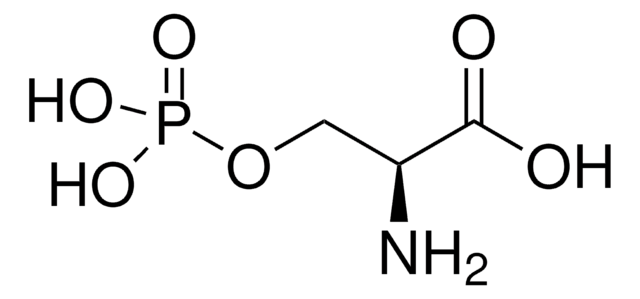840063C
Avanti
18:0-18:2 PS
1-stearoyl-2-linoleoyl-sn-glycero-3-phospho-L-serine (sodium salt), chloroform
Synonym(s):
1-octadecanoyl-2-(9Z,12Z-octadecadienoyl)-sn-glycero-3-phospho-L-serine (sodium salt); PS(18:0/18:2(9Z,12Z))
About This Item
Recommended Products
Assay
>99% (TLC)
form
liquid
packaging
pkg of 1 × 1 mL (840063C-10mg)
manufacturer/tradename
Avanti Polar Lipids 840063C
concentration
10 mg/mL (840063C-10mg)
lipid type
cardiolipins
phospholipids
shipped in
dry ice
storage temp.
−20°C
SMILES string
[H][C@@](COP([O-])(OC[C@](C([O-])=O)([H])[NH3+])=O)(OC(CCCCCCC/C=C\C/C=C\CCCCC)=O)COC(CCCCCCCCCCCCCCCCC)=O.[Na+]
InChI
1S/C42H78NO10P.Na/c1-3-5-7-9-11-13-15-17-19-21-23-25-27-29-31-33-40(44)50-35-38(36-51-54(48,49)52-37-39(43)42(46)47)53-41(45)34-32-30-28-26-24-22-20-18-16-14-12-10-8-6-4-2;/h12,14,18,20,38-39H,3-11,13,15-17,19,21-37,43H2,1-2H3,(H,46,47)(H,48,49);/q;+1/p-1/b14-12-,20-18-;/t38-,39+;/m1./s1
InChI key
AHMHWPOYIVVEKN-PTDXFASBSA-M
General description
Application
Packaging
Legal Information
Signal Word
Danger
Hazard Statements
Precautionary Statements
Hazard Classifications
Acute Tox. 3 Inhalation - Acute Tox. 4 Oral - Carc. 2 - Eye Irrit. 2 - Repr. 2 - Skin Irrit. 2 - STOT RE 1 - STOT SE 3
Target Organs
Central nervous system
Storage Class Code
6.1D - Non-combustible, acute toxic Cat.3 / toxic hazardous materials or hazardous materials causing chronic effects
WGK
WGK 3
Flash Point(F)
does not flash
Flash Point(C)
does not flash
Regulatory Listings
Regulatory Listings are mainly provided for chemical products. Only limited information can be provided here for non-chemical products. No entry means none of the components are listed. It is the user’s obligation to ensure the safe and legal use of the product.
EU REACH Annex XVII (Restriction List)
Certificates of Analysis (COA)
Search for Certificates of Analysis (COA) by entering the products Lot/Batch Number. Lot and Batch Numbers can be found on a product’s label following the words ‘Lot’ or ‘Batch’.
Already Own This Product?
Find documentation for the products that you have recently purchased in the Document Library.
Our team of scientists has experience in all areas of research including Life Science, Material Science, Chemical Synthesis, Chromatography, Analytical and many others.
Contact Technical Service










